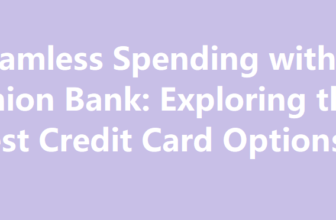
10 Simple Rules to Follow to Use Credit Cards in India
Credit cards have emerged as a vital cog in the wheel of financial management, offering unparalleled convenience and flexibility in executing transactions and making purchases. While they hold tremendous potential to empower individuals to take control of their finances, their misuse can spell doom and result in severe financial woes. India has witnessed a surge in the usage of credit cards, a trend that has been on the rise for some time now. Consequently, it has become imperative to comprehend the guidelines governing their optimal usage. In this article, we present to you ten straightforward yet indispensable rules that will enable you to harness the full potential of credit cards while avoiding any possible financial predicament. By following these rules, you can effectively manage your finances, mitigate potential risks, and navigate the complex landscape of credit cards in India.
10 Simple Rules to Follow to Use Credit Cards in India?
Rule 1: Understand the Terms and Conditions of Your Credit Card
To wield a credit card in India with consummate skill, the first commandment you must heed is to grasp the terms and conditions that regulate your credit card usage. The fine print and clauses of your credit card divulge the framework of norms and regulations governing your card usage. Before using your credit card, you must peruse and comprehend these terms and conditions.
The terms and conditions of your credit card encompass critical elements such as the annual percentage rate (APR), credit limit, and fees and penalties associated with your card. The APR denotes the interest rate levied on the outstanding balance of your credit card. It is crucial to grasp the APR of your card as it can have a telling impact on the interest that you will have to bear.
The credit limit is the maximum amount of credit that your credit card issuer extends to you. Understanding your credit limit is pivotal, as exceeding it can culminate in fees and penalties that can prove to be heavy on your pocket.
The fees and penalties associated with your credit card may include late payment fees, over-limit fees, cash advance fees, and balance transfer fees. Acquainting yourself with these charges and levies will help you steer clear of unnecessary financial expenses.
To efficiently manage your credit card usage and avoid the morass of avoidable expenses and penalties, it is imperative to grasp the terms and conditions of your credit card.
Rule 2: Make Payments on Time
The second rule is crucial to pay your credit card bill on or before the due date in India. The due date is typically the same each month, so make sure to mark it on your calendar and pay on time. Late payment fees can snowball and create a monstrous amount owed in no time. Not only that, but credit card issuers will slap you with interest charges on any outstanding balance. The longer you take to pay it off, the more interest you will accrue, resulting in a heavier financial burden. To avoid interest charges, pay off your entire credit card balance each month.
Not only do late payments impact your wallet, but they can also negatively affect your credit score. A poor credit score can make it difficult to obtain credit in the future, so it’s essential to maintain a good score by making payments on time. By following this rule, you can effectively manage your credit card usage, dodge unnecessary fees and charges, and maintain a strong credit score.
Rule 3: Pay More Than the Minimum Amount Due
The third rule of using a credit card in India is a biggie. Thou shalt resist the urge to pay only the minimum amount due on the credit card bill. While it may seem like an easy way out, it can lead to a world of debt and financial pain. The longer you take to pay off your balance, the more interest you’ll have to cough up to the credit card company. It’s like a never-ending cycle of doom.
But fear not, my dear friends! There is a way out of this dark abyss. Paying more than the minimum amount due can help you break free from the chains of debt and save moolah on interest charges. It’s a double whammy of good news, my friends! You’ll be debt-free sooner and keep more of your hard-earned cash in your pocket.
But wait, there’s more! When you’re paying more than the minimum amount due, be sure to prioritize high-interest debt first. Don’t let those pesky interest charges drain your wallet dry! Tackle the high-interest debt first and watch your savings grow faster.
By paying more than the minimum amount due, you can manage your credit card like a boss, pay off your debt like a pro, and maintain a good credit score like a champ. It’s a triple win, folks!
Rule 4: Keep Track of Your Spending
The fourth rule of the credit card game in India – keeping a hawk’s eye on your spending. It’s critical to monitor your credit card usage to steer clear of overspending and falling into a financial abyss.
By keeping track of your spending, you can budget effectively and guarantee that you can pay off your credit card balance every month. You can do this by regularly reviewing your credit card statements or using budgeting apps to track your expenses.
But wait, there’s more! When scrutinizing your credit card statements, be on the lookout for any bogus charges or unauthorized transactions. If you see anything suspicious, call your credit card issuer immediately.
It’s also important to set a budget for your credit card usage that considers your income and expenses. This way, you can ensure that you can pay off your credit card balance every month without breaking a sweat.
By monitoring your spending and sticking to your budget, you can handle your credit card usage like a pro, steer clear of overspending, and maintain an excellent credit score.
VI. Rule 5: Use Credit Cards Only for What You Can Afford
Let’s move on to the fifth rule of the credit card game in India, which is to use credit cards only for what you can afford. Don’t make the mistake of using credit cards to finance purchases that are beyond your means, or you might find yourself neck-deep in debt and paying a fortune in interest. Before making a purchase with your credit card, consider your budget and financial situation carefully.
When using your credit card, take into account the impact that the purchase will have on your overall credit card balance. Think about how long it will take you to pay off the purchase and how much interest you’ll have to fork over. Be wise, folks!
And let’s not forget about cash advances, shall we? Avoid using credit cards for cash advances like the plague! These cash advances often come with exorbitant interest rates and fees, which can lead to mountains of debt that are difficult to climb.
By using credit cards only for what you can afford, you can manage your credit card usage like a champ, avoid unnecessary debt, and keep your credit score looking sharp.
VII. Rule 6: Do Not Share Your Credit Card Details
The sixth rule of the credit card game in India is to never spill the beans on your credit card details. Your card number, expiration date, and CVV are sensitive information that should only be used by you. Letting others in on this can lead to a tsunami of fraudulent charges on your account and put you at risk of identity theft. So, it’s essential to keep your credit card details under wraps and not share them with anyone.
When making online transactions with your credit card, make sure you’re on a secure website. Avoid storing your credit card details on websites or apps, as this can put your information at risk. And if you suspect that your credit card details have been compromised, contact your credit card issuer immediately to have your account frozen or canceled. Monitor your credit card statements for any unauthorized charges too.
By keeping your credit card details to yourself, you can master the art of managing your credit card usage like a boss, avoid the headache of fraudulent charges, and keep your financial information safe and sound.
Rule 7: Be Aware of Credit Card Rewards and Benefits
The seventh rule for the wise usage of a credit card in India is to discern the intricate tapestry of rewards and benefits that your credit card issuer might present. These beauteous rewards and benefits are designed to stimulate card usage, and it is of paramount importance to exploit them to the fullest.
The rewards that a credit card can offer are myriad and enchanting, including cashback, reward points, and discounts on purchases. Similarly, the benefits that can be bestowed upon you are a cornucopia of delights, ranging from travel insurance to airport lounge access, and even lavish concierge services.
To fully seize upon these treasures of credit card rewards and benefits, you must first apprehend the terms and conditions that govern your credit card usage. Moreover, one must be cognizant of any and all fees associated with the credit card, such as the dreary annual fees or the odious foreign transaction fees.
When wielding your credit card for purchases, it is essential to appraise the rewards and benefits that may be gleaned from the transaction. One must also muse on how to augment these rewards by making purchases that offer higher reward points, thereby unlocking even more wondrous gifts from the credit card issuer.
By being mindful of credit card rewards and benefits, one can deftly manage credit card usage, reap bountiful rewards, and hoard vast treasures of wealth by availing discounts on purchases.
Rule 8: Keep Your Credit Utilization Ratio Low
The eighth rule for using credit card usage in India is to ensure that the credit utilization ratio remaineth low. The credit utilization ratio, being the percentage of credit that has already been used up, is a critical factor that credit bureaus employ to calculate the credit score.
Should the credit utilization ratio be high, it may lead to a devastating blow to the credit score, making it an arduous task to procure credit in the future. Thus, it is of utmost importance to maintain a low credit utilization ratio by utilizing only a fraction of the credit that has at your disposal.
Ideally, the credit utilization ratio should be less than 30%. Suppose the credit limit is Rs. 50,000; in that case, it is prudent to restrict the credit card balance below Rs. 15,000.
To keep the credit utilization ratio at an acceptable level, avoid maxing out the credit card or carrying a balance from month to month. Moreover, consider requesting a credit limit increase to increase the available credit, thereby lowering the credit utilization ratio.
By maintaining a low credit utilization ratio, thou canst astutely manage credit card usage, uphold a stellar credit score, and bolster the prospects of acquiring credit in the future.
Rule 9: Check Your Credit Report Regularly
The ninth commandment to abide by when wielding a credit card in India is to scrutinize the credit report regularly. The credit report is a succinct summary of the credit history, which includes the credit accounts, payment history, and credit inquiries.
Frequent inspection of the credit report can aid thee in spotting errors or inaccuracies that might have a negative impact on the credit score. It can also enable thee to detect any fraudulent activity that may have occurred on the credit accounts.
In accordance with the Credit Information Companies (Regulation) Act of 2005, every individual is entitled to access one free credit report per year from each of the four credit bureaus in India. Additionally, thou canst request a credit report at any time for a nominal fee.
When examining the credit report, thou must review it meticulously for any errors or inaccuracies. In case thou dost find any mistakes, thou shouldst dispute them with the credit bureau to have them rectified.
By frequently scrutinizing the credit report, thou canst shrewdly manage credit card usage, uphold an exemplary credit score, and ensure the veracity of the credit history.
Rule 10: Use Your Credit Card Responsibly
The tenth and final rule to use a credit card in India is to exhibit responsible usage. Exercising responsible usage of the credit card implies using it only for purchases that thou art capable of paying off in full and punctually.
Being responsible also implies evading unnecessary debt and using the credit card solely for emergency expenses or premeditated purchases. It is crucial to have a budget in place and adhere to it when deploying the credit card.
To behave responsibly, must avoid cash advances and balance transfers, as they usually carry exorbitant interest rates and fees. Also abstain from utilizing the credit card to pay for everyday expenses, such as groceries and gas.
Engaging in responsible usage can help thee preserve an admirable credit score, avoid debt, and accomplish their financial objectives. By adhering to the preceding nine edicts and using the credit card responsibly, thou canst effectively govern credit card usage and enhance financial prosperity.
Conclusion
Credit cards can be a perplexing financial tool for those who are not familiar with their intricacies. They can be a source of significant financial burdens and can have long-term consequences if not used correctly. Therefore, it is essential to follow ten straightforward rules when using credit cards in India.
By following these ten rules, you can effectively manage your credit card usage, maintain a good credit score, and achieve your financial goals. However, if you find it difficult to manage your finances, seek professional financial advice to avoid any financial trouble.





